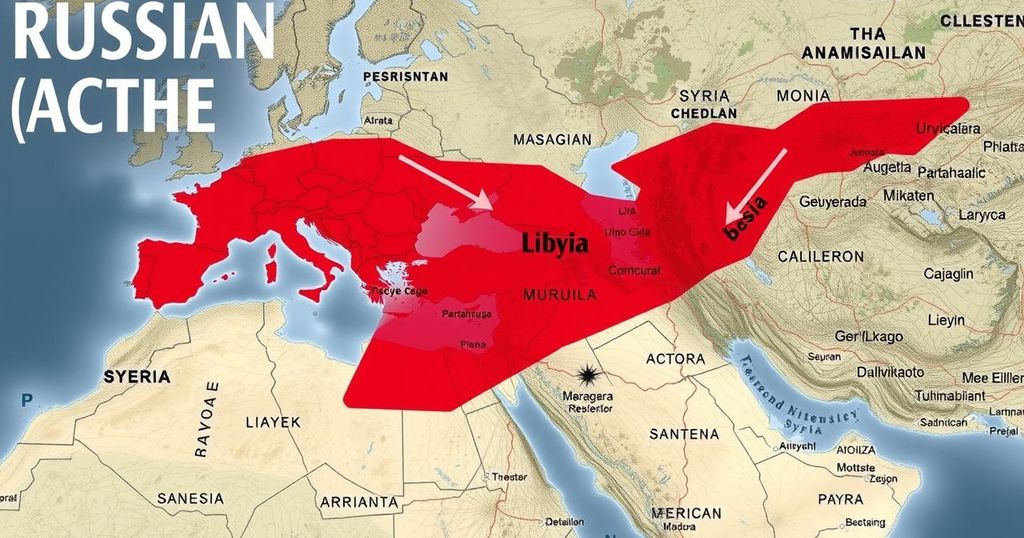Analysts Consider Russia’s Military Shifts from Syria to Libya and Implications

Analysts explore Russia’s possible military shift to Libya from Syria, evaluating the consequences for regional stability and NATO’s interests. With strategic positions in Syria potentially diminishing, Libya emerges as a key alternative for Russia. The power struggle within Libya raises concerns about increased influence for Khalifa Haftar, while broader geopolitical tensions heighten as Russia seeks to project its power across North Africa and into Europe.
Analysts are contemplating Russia’s potential shift from Syria to Libya, as the completion of military objectives in Syria raises questions about its strategic positions in the region. While the Kremlin remains vested in maintaining its influence across the Mediterranean and Africa, particularly given its established military bases in Syria, the future of these assets has been notably uncertain. If Russia indeed considers transferring its military presence to Libya, analysts speculate on the consequential effects this might have on both Libyan stability and NATO’s strategic interests.
Russia’s involvement in Syria has been crucial in supporting President Bashar al-Assad’s regime, providing key military and diplomatic assistance that has allowed for the establishment of vital military infrastructure. However, with the recent shift of power to the administration headed by Hayat Tahrir al-Sham, uncertainties surround the continued operation of Russian bases in Syria, prompting the need for alternative footholds. Libya is seen as a feasible option for the Kremlin, bringing with it significant implications for the balance of power in North Africa and beyond.
The African continent has become a top priority for Russian foreign policy since 2017, with military forces deployed across nations such as Mali and the Central African Republic. This ambition is fueled by perceptions of diminishing Western influence, countered by rising powers like China and Turkey. An increased military presence in Libya would serve Russia’s long-term objective of asserting its influence in this strategic region, enabling it to potentially disrupt European operations and interests.
Yet, internal conflicts in Libya complicate matters. The nation remains divided politically, with two rival governments unwilling to compromise. A significant Russian military presence could provide support to the eastern government led by Khalifa Haftar, straining ongoing diplomatic negotiations facilitated by the United Nations. Analysts warn that this could empower Haftar unduly, destabilizing Libya further and allowing him significant leverage in the political landscape.
Moreover, the situation poses a challenge for NATO, as an entrenched Russian military presence would serve as a point of pressure for Europe, particularly regarding issues related to migration and energy supplies. As efforts to engage with Haftar continue among Western officials, there is an underlying recognition of heightened tensions as his alignment with Russia deepens. Russia’s strategy reflects a careful calculation, demonstrating its desire to extend its geopolitical influence while navigating the complexities of the Libyan conflict and regional transformations.
The article discusses the potential implications of Russia’s military repositioning from Syria to Libya following developments in the Syrian conflict. Russia’s military strategy, aiming to maintain influence in the Mediterranean and Africa, has drawn attention from analysts contemplating the repercussions of these movements on the political and military dynamics of Libya and NATO. Understanding the historical context of Russia’s involvement in Syria, as well as its broader ambitions in Africa, is crucial in assessing the complexities of the situation.
In conclusion, analysts indicate that Russia’s potential redeployment from Syria to Libya poses significant geopolitical questions. While Syria’s waning military significance compels a search for new strategic footholds, Libya’s internal power dynamics may complicate Russia’s ambitions. Moreover, an enhanced Russian presence near NATO’s borders could escalate tensions in the region, raising concerns about military posture and diplomatic negotiations involving Libya’s internal factions. The choices made by Russia will have lasting implications for its role in the Mediterranean and broader African context.
Original Source: www.aljazeera.com








